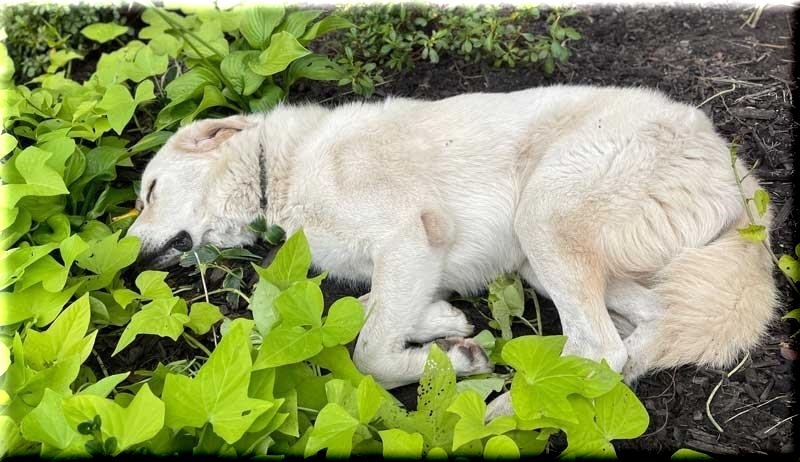Garden
How to Keep Dogs Out of Your Garden: Understanding Why Dogs Dig and Creating Barriers
You’ve carefully chosen your plants, nurtured the soil, and created a beautiful garden oasis. But what happens when your furry friend decides to turn your carefully cultivated space into a digging ground? Keeping dogs out of your garden can be a challenge, but it’s not impossible. Understanding why dogs dig and creating effective barriers are essential for protecting your garden and maintaining a harmonious relationship with your pet.
Understanding Why Dogs Dig in Gardens
Dogs are natural diggers, and their instinct to dig can be a source of frustration for gardeners. It’s important to understand the reasons behind this behavior to effectively deter digging. Boredom is a common culprit; dogs need mental and physical stimulation, and without it, they may resort to digging as an outlet for pent-up energy. Instinct plays a role as well, as digging is a natural behavior for dogs. They may dig to bury bones, create dens, or even just to explore their surroundings. Seeking attention is another reason, as digging can be a way for dogs to get a reaction from their owners. Finally, dogs may dig to escape from a confined area or to cool off in hot weather.
Creating Physical Barriers
A good fence is often the most effective way to keep dogs out of your garden. It acts as a physical barrier that prevents them from accessing the area. When building a dog-proof fence, you need to consider the height, material, and installation. A fence should be tall enough to prevent your dog from jumping over it, and strong enough to withstand digging attempts. Wood, metal, or vinyl are all suitable materials, but each has its own advantages and disadvantages. You should also ensure that the fence is properly anchored to the ground to prevent it from being pushed over.
If a fence isn’t feasible, you can use other physical barriers to deter digging. Prickly hedges like roses and holly can create a natural barrier that dogs will be hesitant to cross. You can also use rocks, gravel, or netting to discourage digging in specific areas.
Using Natural Repellents
Homemade repellents can be a simple and effective way to deter dogs from your garden. Vinegar, citrus, and pepper are all common ingredients that dogs find unpleasant. For example, you can mix equal parts of water and vinegar in a spray bottle and apply it to areas where your dog likes to dig. Citrus-scented essential oils can also be used, but remember to dilute them with water before spraying to prevent irritation.
Commercial repellents are another option, but it’s important to choose products that are safe for both your plants and your pet. Some commercial repellents contain ingredients that are toxic to dogs, so it’s essential to check the label carefully before using them.
Planting Deterrent Plants
Many plants emit strong scents that dogs find unpleasant, which can help keep them out of your garden. Marigolds are a popular choice for deterring dogs and other pests. Their pungent odor is a natural dog repellent. Lavender, rosemary, and rue are also known to deter dogs with their strong scents.
When planting deterrent plants, consider strategic placement. You can plant them in borders around your garden or intercrop them with your other plants. In addition to their dog-repelling qualities, these plants can also attract pollinators and repel harmful insects, offering additional benefits to your garden.
Training and Behavior Modification
Training and behavior modification are crucial for preventing digging in your garden. Positive reinforcement training methods are the most effective way to teach your dog to stay out of your garden. This involves rewarding your dog for good behavior, such as staying out of the garden, with treats or praise.
You can also redirect digging behavior by creating a designated digging area for your dog. This could be a sandbox or a patch of soil in a different area of your yard. When your dog starts digging in the garden, redirect them to their digging area and praise them when they dig there.
It’s also important to address underlying issues that may be contributing to digging. If your dog is bored or anxious, they may be more likely to dig. Ensure your dog gets enough exercise and mental stimulation. You may also want to consider consulting with a professional dog trainer for help with behavior modification.
Other Helpful Strategies
Q: What if my dog is already digging in my garden?
A: If your dog is already digging in your garden, it’s important to act quickly to deter them from digging further. Start by addressing any underlying issues, such as boredom or anxiety. Then, implement one or more of the strategies discussed above, such as creating a physical barrier, using repellents, or planting deterrent plants.
Q: How can I stop my dog from digging up my newly planted flowers?
A: Protecting newly planted flowers is essential to prevent damage. You can use a mesh netting or chicken wire to create a temporary barrier around your flowers until they become established. You can also try using a commercial repellant or homemade vinegar-based solution to deter digging.
Q: Are there any natural repellents that actually work?
A: Many natural repellents are effective at deterring dogs. Citrus-based sprays, vinegar solutions, and strong-scented plants like marigolds and lavender can all be helpful. However, the effectiveness of these repellents may vary depending on the individual dog and their sensitivity to scents.
Q: Is it cruel to use a motion-activated sprinkler to deter my dog?
A: While motion-activated sprinklers can be effective in deterring dogs, it’s important to use them responsibly. Ensure the water pressure is low enough to avoid harming your dog. It’s also a good idea to use a sprinkler that only activates in a specific area, such as your garden beds.
Q: What are the best dog breeds to avoid digging in the garden?
A: Some dog breeds are known for their digging habits, while others are less likely to dig. Breeds like terriers, beagles, and retrievers often have a strong instinct to dig, while breeds like poodles, bulldogs, and basset hounds are generally less prone to digging. However, it’s important to note that individual dogs within a breed can vary in their behavior, and even dogs that are not typically diggers can develop digging habits if they are bored or anxious.
Conclusion
Keeping dogs out of your garden requires a multi-faceted approach. By understanding why dogs dig, creating physical barriers, using natural repellents, and implementing training strategies, you can protect your garden and maintain a harmonious relationship with your furry friend. Don’t hesitate to share your own tips and tricks in the comments below, and be sure to explore our website for more insightful gardening advice!



Leave a Reply